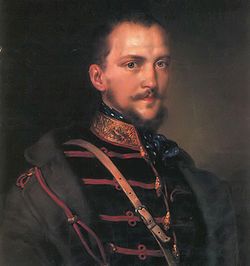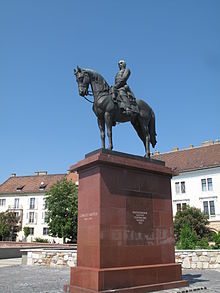- Artúr Görgey
-
The native form of this personal name is Görgey Artúr. This article uses the Western name order.
Artúr Görgey 
Artúr Görgey painted by Miklós BarabásBorn 30 January 1818
Toporec, Upper Hungary (now Slovakia)Died 21 May 1916 (aged 98)
Visegrád or BudapestAllegiance  Hungarian Revolutionary Army
Hungarian Revolutionary ArmyRank General Battles Vác
Káplona
Gödöllő
Isaszeg
Nagysalló
KomáromArtúr Görgey de Görgő et Toporcz (Hungarian: görgői és toporczi Görgey Artúr, German: Arthur Görgey von Görgő und Toporcz; 30 January 1818 – 21 May 1916) was a Hungarian military leader.
He was born at Toporz (today Toporec) in Upper Hungary of a Hungarian noble family of originally Zipser German descent who immigrated to Upper Hungary during the reign of king Géza II (1131–1161). During the reformation they were converted to Protestantism. The family name refers to their origin from Görgő village [1] (< Hungarian: Görgő-i "of Görgő")
In 1837 he entered the Bodyguard of Hungarian Nobles at Vienna, where he combined military service with a course of study at the university. In 1845, on his father's death, he left the army to study chemistry at the University of Prague, after which he retired to the family estates in Hungary.
When the Hungarian Revolution of 1848 broke out against the Austrian Empire, Görgey joined the rebels. He entered the Honvéd Army with the rank of captain, was employed in the purchase of arms, and soon became major and commandant of the national guards north of the Tisza. While resisting the Croatian army 's crossing of the Danube at Csepel-sziget, Görgey captured and arrested the wealthy Hungarian Count Ödön (Edmund) Zichy. Count Zichy was charged with treason for his pro-Austrian activities, court-martialed, and hanged.
After various successes over the Croatian forces, of which the most remarkable was at Ozora, where 10,000 prisoners were taken, Görgey was appointed commander of the army of the Upper Danube. But when Austrian troops under Windisch-Grätz advanced across the Lajta, he resolved to fall back. In spite of the remonstrances of his political superior, Lajos Kossuth, he held to his resolution and retreated upon Vác. Here, irritated by what he considered undue interference with his plans, he issued (5 January 1849) a proclamation throwing the blame for the recent want of success upon the government, thus virtually revolting against their authority. Görgey retired to the Hungarian Ore Mountains and conducted operations on his own initiative.
The supreme command was conferred upon Henryk Dembiński, but when he lost the Battle of Kápolna (where Görgey's corps arrived too late to take an effective part) the command was again conferred upon Görgey. He conducted the spring 1849 campaign brilliantly and defeated Windisch-Grätz in a series of engagements. In April, Görgey won at Gödöllő, Isaszeg, and Nagysalló (now Tekovské Lužany), relieved Komárom (now Komárno), and again won at Vác. He failed to follow up his successes by taking the offensive against the Austrian frontier, contenting himself with besieging Buda, the Hungarian capital, in which he desired to re-establish the Diet. After taking Buda, Görgey remained inactive for some weeks.
Meanwhile, at a Diet held at Debrecen, Kossuth had formally proposed the dethronement of the Habsburg dynasty. Görgey had refused Kossuth's offer of the field-marshal's baton, and was not in sympathy with the new regime. However, he accepted the portfolio of minister of war, while retaining the command of the troops in the field. The Russians had now intervened in the struggle and made common cause with the Austrians; the allies were advancing into Hungary on all sides. Kossuth saw the impossibility of continuing the struggle and resigned his position as regent-president. Görgey, who had been fighting hard against the enemy, succeeded him as military dictator with emergency powers. Convinced that he could not break through the enemy's lines, Görgey surrendered his army of 20,000 infantry and 2,000 cavalry to the Russian general Rüdiger in the Surrender at Világos.
Görgey was not court-martialed, as his generals were, but kept in confinement at Klagenfurt. He lived there, chiefly employed in chemical work, until 1867, when he was pardoned and returned to Hungary. The surrender, and particularly the fact that his life was spared while his generals and many of his officers and men were hanged or shot, led to his being accused of treason by public opinion. After his release he played no further part in public life.
In 1885, an attempt by a large number of his old comrades to rehabilitate him was not favorably received in Hungary. After some years work as a railway engineer he retired to Visegrád, where he lived in retirement. For decades he had been considered a traitor, often humiliated in public places, but in the last years of his life, his very important role during the War and unique military talent became widely acknowledged by his compatriots.
 Artúr in old age.
Artúr in old age.
General Görgey wrote a justification of his operations (Mein Leben und Wirken in Ungarn 1848–1849, Leipzig, 1852), an anonymous paper under the title Was verdanken wir der Revolution? (1875), and a reply to Kossuth's charges (signed Joh. Demar) in Budapesti Szemle, 1881, pp. 25–26. Amongst those who wrote in his favor were Captain Stephan Görgey (1848–1849 bol, Budapest, 1885), and Colonel Aschermann (Ein offenes Wort in der Sache des Honved-Generals Arthur Görgey, Klausenburg, 1867).
External links
- Artúr Görgey (1852). My life and acts in Hungary in the years 1848 and 1849. Harper. http://books.google.com/books?vid=OCLC03440509&id=HVO4xyz3k2sC&dq=zichy&as_brr=1., full public-domain text of Görgey's Mein Leben und Wirken in Ungarn 1848–1859, in English translation
Political offices Preceded by
Lázár MészárosMinister of War
1849Succeeded by
Lajos AulichMinisters of Defence of Hungary since 1848 Revolution of 1848 Kingdom of Hungary Transition period Regency Transition period Communist Hungary Republic of Hungary Hungarian Revolution of 1848 Belligerents Pretext Major battles Other battles Buda · Isaszeg · Vienna UprisingInfluence  Leaders for AustriaFerdinand I of Austria · Franz Joseph I of Austria · Eduard Clam-Gallas · Julius Jacob von Haynau · Josip Jelačić · Prince Franz de Paula of Liechtenstein · Alexander von Lüders · Fjodor Szergejevics Panutyin · Franz Schlik · Alfred I, Prince of Windisch-Grätz
Leaders for AustriaFerdinand I of Austria · Franz Joseph I of Austria · Eduard Clam-Gallas · Julius Jacob von Haynau · Josip Jelačić · Prince Franz de Paula of Liechtenstein · Alexander von Lüders · Fjodor Szergejevics Panutyin · Franz Schlik · Alfred I, Prince of Windisch-Grätz Leaders for HungaryLajos Batthyány · Józef Bem · János Damjanich · Henryk Dembiński · Arisztid Dessewffy · Artúr Görgey · Richard Guyon · György Klapka · György Kmety · Lajos Kossuth · Vilmos Lázár · János Móga · Alessandro Monti · Ferenc Ottinger · Mór Perczel · István Széchenyi · Bertalan Szemere
Leaders for HungaryLajos Batthyány · Józef Bem · János Damjanich · Henryk Dembiński · Arisztid Dessewffy · Artúr Görgey · Richard Guyon · György Klapka · György Kmety · Lajos Kossuth · Vilmos Lázár · János Móga · Alessandro Monti · Ferenc Ottinger · Mór Perczel · István Széchenyi · Bertalan SzemereReferences
 This article incorporates text from a publication now in the public domain: Chisholm, Hugh, ed (1911). Encyclopædia Britannica (11th ed.). Cambridge University Press.
This article incorporates text from a publication now in the public domain: Chisholm, Hugh, ed (1911). Encyclopædia Britannica (11th ed.). Cambridge University Press.- Pethő Sándor: Görgey Artúr, Genius, Budapest, 1930
See also: GörgeyCategories:- 1818 births
- 1916 deaths
- 19th-century Hungarian people
- Hungarian soldiers
- Defence ministers of Hungary
- People of the Revolutions of 1848
- Hungarian nobility
- Chemical engineers
- Hungarian engineers
- Hungarian people of German descent
- Hungarians in Slovakia
- Hungarian expatriates in Austria
- Hungarian expatriates in the Czech lands
- People from Kežmarok District
- People from Spiš county
Wikimedia Foundation. 2010.

